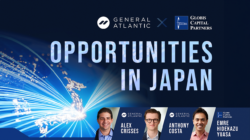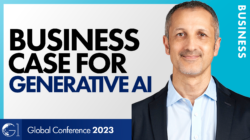Leading High Performing Remote Teams
How can leaders ensure that performance remains high in remote or hybrid-work environments?
Content Marketing
In this course, you’ll learn how compelling blogs, videos, podcasts, and other media can reach customers and drive sales. You’ll also learn steps for creating an effective content marketing plan, and some important ways to measure its impact and success.
Content marketing is a essential digital marketing strategy for companies looking to provide relevant and useful information to support your community and attract new customers.
Get started on your content marketing journey today.
Sustainable Innovation in Times of Disruption: Choices for a Better Society
There are opportunities for progress all around us. The key is to innovate on these opportunities sustainably.
To help identify most effective path forward, you'll need to gain a global perspective to these challenges in an open discussion. How can Japan and the world take action to create a more sustainable, innovative world? Where do you fit in?
It's time to find out.
Social Media & Digital Communications: Impact on Global Public Opinion
Social and digital media have dominated the communications industry for decades. But it's no secret that social media has the power to sway public opinion, and the way in which many companies use these platforms could be seen as manipulative.
What do companies need to be aware of when utilizing social and digital media? How can these mediums be used to better communicate strategically with the world?
Discover what top media and communications experts have to say.
CAGE Distance Framework
Want to expand overseas? The CAGE distance framework can help ensure you're constructing a solid global strategy in four areas: cultural, administrative, economic, and geographic. Learn how to leverage useful differences between countries, identify potential obstacles, and achieve global business success.
Servant Leadership
There's more to leadership than driving a team to profit. In fact, there's a word for looking beyond self-interest to prioritize individual growth: servant leadership. Try this course for a quick breakdown of what that is, how it works, and how it can lead to organizational success.
Strategy: Creating Value Inside Your Company
Have you ever wondered why certain companies are more successful than others? The answer is strategy: internal processes that control costs, allocate resources, and create value. This course from GLOBIS Unlimited can give you the tools you need for that strategic edge.
Strategy: Understanding the External Environment
To plan strategy on any level, you need to understand your company's external environment. In fact, your level of understanding can impact hiring, budgeting, marketing, or nearly any other part of the business world. Want to learn how to do all that? This course from GLOBIS Unlimited is the perfect first step!
Using Japanese Values to Thrive in Global Business
Japanese companies have unique cultural, communication, and operational challenges. But they also have values that have led to remarkable longevity. Check out this seminar to hear how these values help earn trust from overseas head offices and develop employees.
Marketing: Reaching Your Target
Every company works hard to get its products into the hands of customers. Are you doing everything you can to compete? In this course, you’ll find a winning formula to turn a product idea into real sales. Follow along through the fundamentals of the marketing mix and see how companies successfully bring products to market.
Basic Accounting: Financial Analysis
Want to compare your performance vs. a competitor? Or evaluate a potential vendor? Then you'll need to conduct a financial analysis. This course will teach you how to use three financial statements and evaluate financial performance in terms of profitability, efficiency, soundness, growth, and overall strength.
Career Anchors
What drives you to be good at your job?
Career anchors are based on your values, desires, motivations, and abilities. They are the immovable parts of your professional self-image that guide you throughout your career journey.
Try this short GLOBIS Unlimited course to identify which of the eight career anchors is yours!
Leadership with Passion through Kokorozashi
The key ingredient to success? Passion.
Finding your kokorozashi will unify your passions and skills to create positive change in society. This GLOBIS Unlimited course will help you develop the values and lifelong goals you need to become a strong, passion-driven leader.
As 2023 continues, the complex interplay between rising inflation, financial stability, and evolving global factors is becoming an increasingly prominent concern.
At the inaugural G1 Silicon Valley Conference, Monex Group expert director Jesper Koll and panelists Thierry Porte (Managing Director, J.C. Flowers & Co.), Preethi Prasad (Partner, AT Kearney), and Daniel Springer (Board Director, UiPath and DocuSign), addressed the key trends, challenges, and opportunities that will shape the future of the international economy.
The discussions covered a multitude of topics, from infrastructure growth opportunities and financial services to AI’s role in the labor market. By understanding these factors, industries worldwide can formulate effective strategies to best navigate these challenges and harness burgeoning opportunities to further develop the economy.
Next Article
Jesper Koll: Why You Should be Optimistic About Japan’s Economy
Will AI Enable Scrappy Startups to Take on Big Business?
Opportunities for Global Growth Through Infrastructure
Daniel Springer: Well, again, opportunities are oftentimes structured around growth, to your good point. I’m not anti-growth, to be clear. And I think sectors of the economy need to do that. I think there’s a huge infrastructure opportunity in the US.
I think there’s a huge infrastructure piece that’s actually the part of the Biden plan that I’m most disappointed we’re not making as much traction. I actually look at the Inflation Reduction Act as really much more industrial policy focused on competition with China on key components, primarily around semiconductor innovation.
And I’m not saying that’s not important. I think it is important. And I while I think we may be over pivoting in response to some of the supply chain challenges we saw coming out of COVID, I think there is an opportunity to create a stronger supply chain.
I tend to think about opportunities from my lens as a classically trained economist. And I believe that comparative advantage, the concept that the economist David Ricardo first articulated, is the key. That means we should be trading. We should have a more interdependent world. And I know that there’s risks, particularly on the financial side, with that. But I think that that really optimizes the most for most people.
The biggest opportunity I see is moving away from the recent trend towards everyone kind of putting their head down and thinking about a closed economy. If you think about the principles of G1, the organization’s drive to, not unlike the World Economic Forum, ask how can countries can work better together and not think so insularly.
I think there’s a huge opportunity to move away from that. I’m not saying there’s aren’t challenges, particularly because of the way we’re viewing China in the West. But I think more globalization is a huge opportunity to to increase the well-being for for everyone on the planet.
Improving the Global Economy with Better Financial services
Thierry Porte: I’ll start with financial services because that’s what I do day in and day out in my business. And I would say that there is a global opportunity to look at FinTech. The industry has absorbed quite a bit of capital, but by and large has failed. The founders there are either very good at the tech and they don’t understand the financials, or vice versa.
There is an opportunity to go through all of that and create more viable competitors that do two things: Take the risk out of the system for individual customers, and provide them with better service.
The irony of these too big to fail banks is that they don’t serve the customers well because they don’t have to. In Japan, when it comes to service, the big banks do not care.
I mean, you realize now that you have to make an appointment to go to Mizuho or MUFG or SMBC. And even if you have one, you still have to wait. And you probably won’t get what you want. It’s not that much different in the United States or in Europe.
So I think there are opportunities to create new models, but you have to go through the attempts at creating new models, which by and large have not succeeded. And work through that to create new models.
Another opportunity has everything to do with the health part of health care, maintaining your health, as opposed to waiting until you do not have health.
But there we have to be very careful because here in the US this is being taken over by private equity, and they are not delivering the outcomes that are needed. If we don’t wake up fast, there’s going to be an enormous backlash, which is going to cost everybody, particularly the owners of those businesses.
A third, more global opportunity, is services to immigrants. I have a view not exactly in the mainstream that we will see significant immigration, for example, in Japan. It’s inevitable. After we’ve eliminated all the other possibilities, we will come back to that. I am quite sure.
But what we need to do is, is and I think this is a private sector opportunity, is to create businesses that can serve that constituency in terms of bringing them in, educating them, getting them ready to be for the workforce, figuring out how they can take care of their children.
Yes, there are language services, but there’s also like, you know, how you go about living your life. And and companies or individuals will pay for that kind of service.
The Role of AI in the Labor Market
Preethi Prasad: In terms of opportunities, there’s tremendous growth in AI automation. Many of my clients in the management consulting sector are asking how to deal with it.
There are some BPO players that are developing sectors or offerings around AI automation and trying to really figure out how can companies harness it.
If you think about it, what is that going to do to the workforce? There should be capacity that’s created within the workforce if really we’re able to harness this technology.
But it’s not that those workers are going to go away. It’s how can we use that talent and that mindshare for more strategic purposes? I think that there is opportunity to for growth in that area.
I also think growth is going to come. I work a lot in the virtualization of healthcare. More companies are entering that space and there’s huge opportunity there. And not only is it opportunity for economic growth, but it’s also for health, population, health care. More people are gaining access to health care through the virtualization of care.




